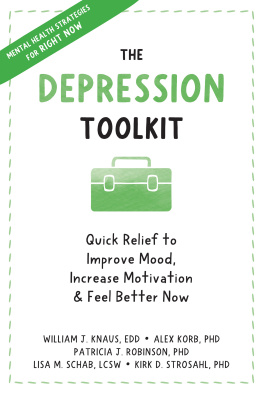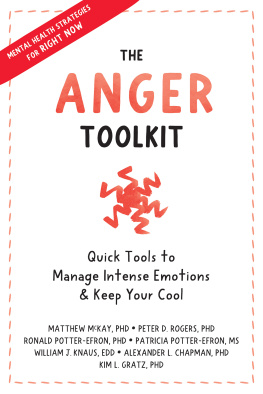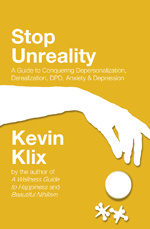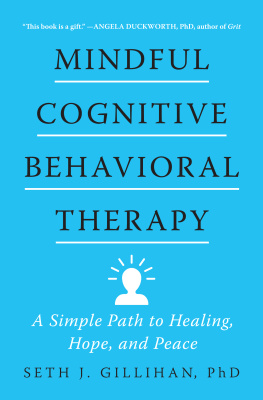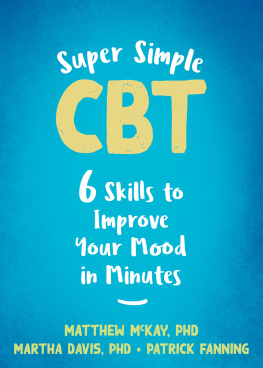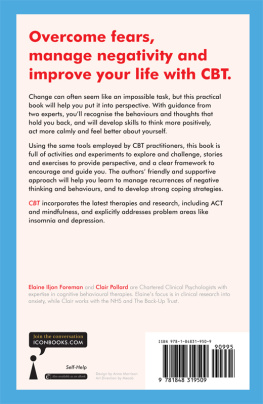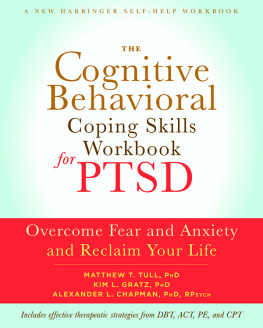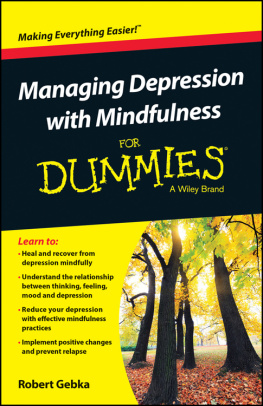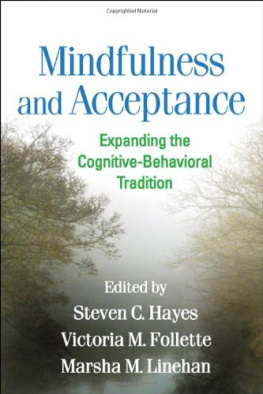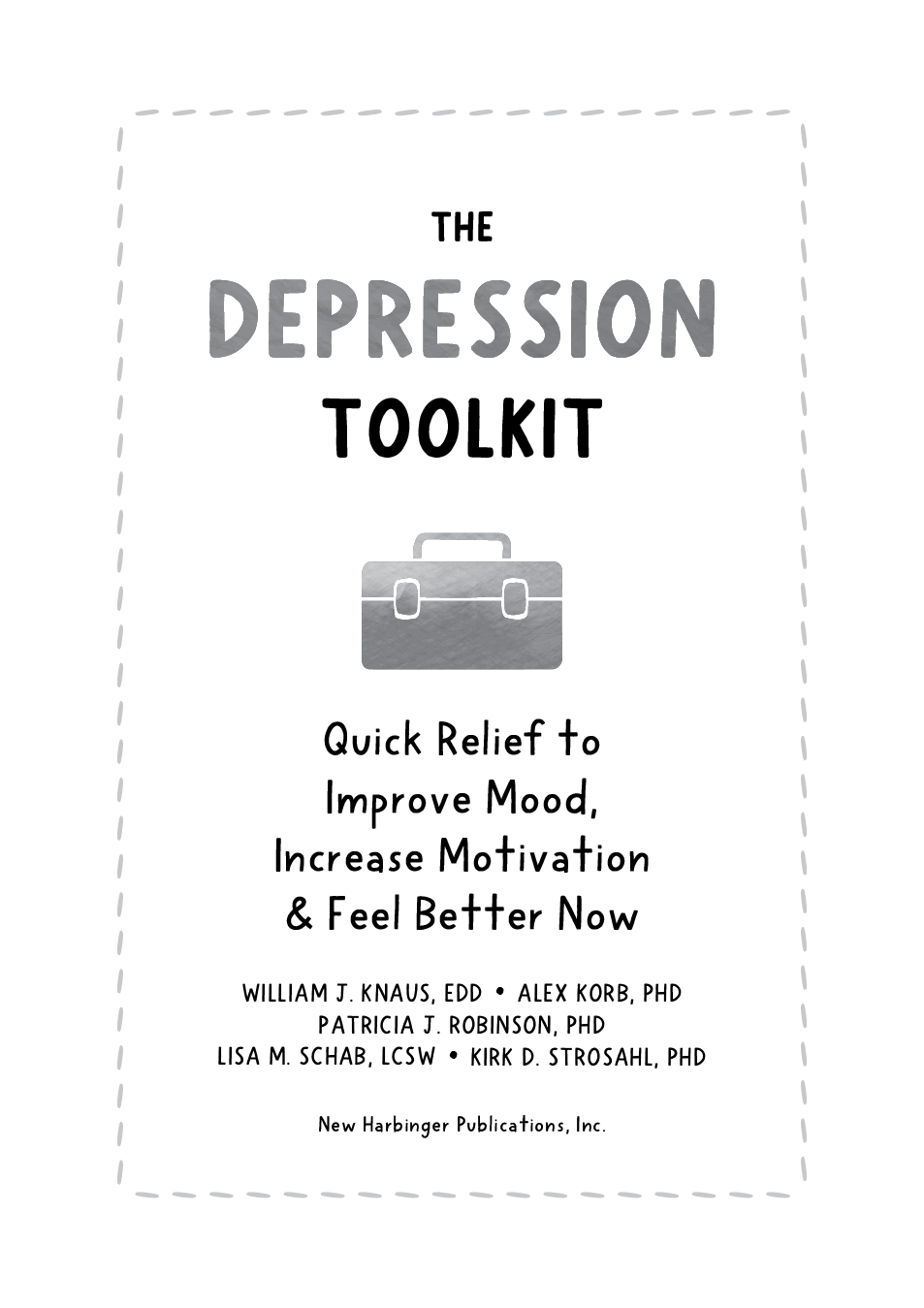Publishers Note
This publication is designed to provide accurate and authoritative information in regard to the subject matter covered. It is sold with the understanding that the publisher is not engaged in rendering psychological, financial, legal, or other professional services. If expert assistance or counseling is needed, the services of a competent professional should be sought.
Distributed in Canada by Raincoast Books
NEW HARBINGER PUBLICATIONS is a registered trademark of New Harbinger Publications, Inc.
Copyright 2022 by Alex Korb, William J. Knaus, Patricia J. Robinson, Lisa Schab, and Kirk Strosahl
New Harbinger Publications, Inc.
5674 Shattuck Avenue
Oakland, CA 94609
www.newharbinger.com
Cover design by Amy Shoup; Acquired by Ryan Buresh; Edited by Joyce Wu
All Rights Reserved
Library of Congress Cataloging-in-Publication Data
Names: Knaus, William J., author. | Korb, Alex, PhD, author. | Robinson, Patricia J., author. | Schab, Lisa M., author. | Strosahl, Kirk, 1950- author.
Title: The depression toolkit : quick relief to improve mood, increase motivation, and feel better now / by William J. Knaus, Alex Korb, Patricia J. Robinson, Lisa M. Schab, Kirk D. Strosahl.
Description: Oakland, CA : New Harbinger Publications, [2022] | Includes bibliographical references.
Identifiers: LCCN 2021039777 | ISBN 9781648480065 (trade paperback)
Subjects: LCSH: Depression, Mental.
Classification: LCC RC537 .K572 2022 | DDC 616.85/27--dc23
LC record available at https://lccn.loc.gov/2021039777
CONTENTS
INTRODUCTION
These are extreme and uncertain times. From natural disasters to downsizing and automation to global pandemics that previously seemed unimaginablenot to mention political division about all of the abovewe have more than enough to feel sad, hopeless, and down about.
When picking up this book, you likely sought relief from the burden of negative thoughts, obsessive thinking about things that wont get any better, or the weighted-down, theres no point feeling that depression leaves in your body. This book will help you feel better, but its important to know that your feelings are valid. These days, it can be hard not to feel that nothing you can do will change either the world or your feelings, or that nothing will get better. These concerns are also valid, and this book is here to help you deal with them in a productive way.
As for the bad dayswe believe that this book can help. The techniques in this mental health toolkit can give you a welcome respite from depressive thoughts and low mood so that you can focus on feeling better in the here and now.
In this short book, we have compiled the easiest and most effective depression-reducing exercises, techniques, and practices from top mental health experts. All these techniques come from evidence-based treatments. By evidence-based, we mean that the tools in this book have been tested and approved in research labs all over the world and have worked for decades with many clients.
Perhaps you have heard about cognitive behavioral therapy, acceptance and commitment therapy, or neuroscience. If you have, then you might have a sense of how this book will help you. If you havent, dont worry. Knowing these therapies is not important to get the most out of this book. Here, we want to focus on improving your mood, helping you get a better understanding of your thoughts, and making sure you are living in accordance with what really matters to you. If you are already interested in these therapies, or if this book inspires your curiosity, you can explore these topics in any number of other books from New Harbinger.
This book starts by teaching you techniques to reduce the kind of spiraling thinking that depression presents before you start the more difficult work of managing how you feel. If youre able, we recommend working through the book from beginning to end, because its easier to work on your depression once youve established a baseline of calm, or nonreactivity.
This book is also designed to get you what you need when you need it, so you dont have to try all of the techniques if you already know what works for you. Similarly, if you find that the mindfulness exercise, for example, works well for you, simply make it a habit and move on to the next part. All the techniques in this book can be used as needed and on demand. They are flexible enough to work with any kind of depression, thought, or feeling, so feel free to jump in and out. Perhaps leaving the book on the coffee tableor somewhere else where its readily availablecan help it to deliver relief when you need it.
As you move through the book, try to bring whatever amount of playfulness you can to these exercises and techniques. We know that it can be tough when youre struggling. But do your best. Its important to keep an open mind. That said, if something doesnt feel like its working for you, drop it and move on to something else. In these pages, you are the priority.
These times are truly distressing, but finding a moment to take care of your mental health doesnt have to be. With thatlets take a deep breath and get started.
PART 1:
FIND REFUGE FROM NEGATIVE THOUGHTS
1: Choose Positive Thoughts
What to Know
The way people think directly affects their moods. One way to combat feelings of depression is by practicing positive thinking instead of negative thinking.
Cameron had just gotten home from work, and he was feeling depressed. His partner noticed that he looked sad and asked him how his day had gone. Cameron said that something upsetting had happened: he had received an award for his performance over the last quarter.
His partner asked why that made him feel upset. Cameron said that he didnt think he deserved the award, and now he would feel pressured to live up to it. Then Cameron said that the office was giving a party for him. His partner said that sounded like fun, but Cameron told her that the party would be at a restaurant that held bad memories for him. It was the last place he had been with his ex-girlfriend before she broke up with him.
When Camerons partner suggested he try to go anyway, Cameron told her there was more. The director was presenting him with a gift certificate to a music store at a nearby mall. It seemed like it was an appropriate and generous gift, but Cameron reminded her that he hated going to the mall because it was so noisy and crowded.
Camerons partner finally told him, Situations arent negative or positive in and of themselves. Its how we choose to think about situations that makes us feel happy or depressed. Youre feeling depressed because you are choosing to think the most negative possible thoughts about everything. What if you tried to think more realistic thoughts, and to look for the positives whenever you can? You might feel much better. They talked about it together, and Cameron decided hed try to change some of his dark thoughts.
The negative thought I dont deserve the award; now Ill feel pressured to live up to it became the positive thought I trust the directors judgment. If he chose me for the award, I must deserve it.
The negative thought I will feel terrible going to that restaurant because of the bad memories became the positive thought I cant avoid that restaurant forever. This is a good chance to create new, positive memories there.
And Cameron found that when he changed his thoughts from negative to positive, his mood changed, too.

